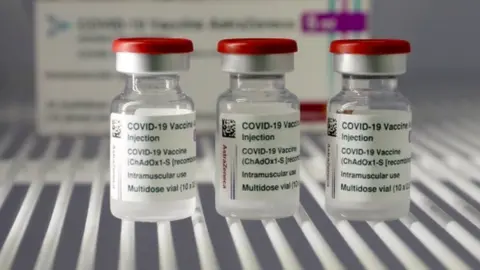Covid-19: UK rejects 'false' vaccine export ban claim by EU
 Reuters
ReutersA diplomatic row has broken out after the EU's top official claimed the UK had imposed an "outright ban" on the export of Covid vaccines.
European Council President Charles Michel said it applied to all vaccines and components produced in the UK.
But Foreign Secretary Dominic Raab described the suggestion as "completely false", the BBC understands.
The EU's deputy ambassador to the UK, Nicole Mannion, was summoned to the Foreign Office for "discussions".
An EU spokesperson said there would be "no further comment" on the meeting "at this stage".
The argument over vaccines comes with European leaders under pressure over the slow distribution of jabs.
In the UK, meanwhile, 22.5 million people - a third of the population - have received their first dose.
In his weekly briefing note, Mr Michel said he was "shocked" to hear the 27-member bloc being accused of "vaccine nationalism" following changes it made to export rules earlier this year.
"Here again, the facts do not lie," he wrote. "The United Kingdom and the United States have imposed an outright ban on the export of vaccines or vaccine components produced on their territory.
"But the European Union, the region with the largest vaccine production capacity in the world, has simply put in place a system for controlling the export of doses produced in the EU."
In response, Mr Raab has written to Mr Michel to "set the record straight", saying the "false claim has been repeated at various levels within the EU and the Commission".
His letter is understood to say: "The UK government has not blocked the export of a single Covid-19 vaccine or vaccine components."

After news of the row broke, Mr Michel tweeted that there were "different ways of imposing bans or restrictions on vaccines/medicines".
But he did not elaborate on this comment.
The EU has faced production problems with the Pfizer-BioNTech, Moderna and Oxford-AstraZeneca vaccines.
In January, it introduced a system of controls on exports, requiring manufacturers to seek permission from national governments for planned sales.
The EU also drafted regulations which would have overridden the Northern Ireland Protocol - agreed with the UK last year - potentially allowing it to stop vaccines bound for Northern Ireland.
But it backed down following widespread criticism.
Earlier this month, Italy blocked a shipment of 250,000 doses of Oxford-AstraZeneca vaccine to Australia.
The UK, which is expected to have a large surplus of vaccines after ordering 400 million doses, has said it will donate most of those left over to poorer countries.
France's President Emmanuel Macron has urged richer countries to put aside up to 5% of their current supplies for this purpose.
